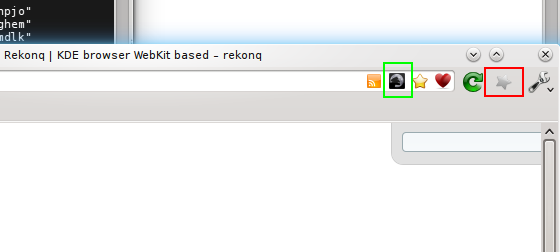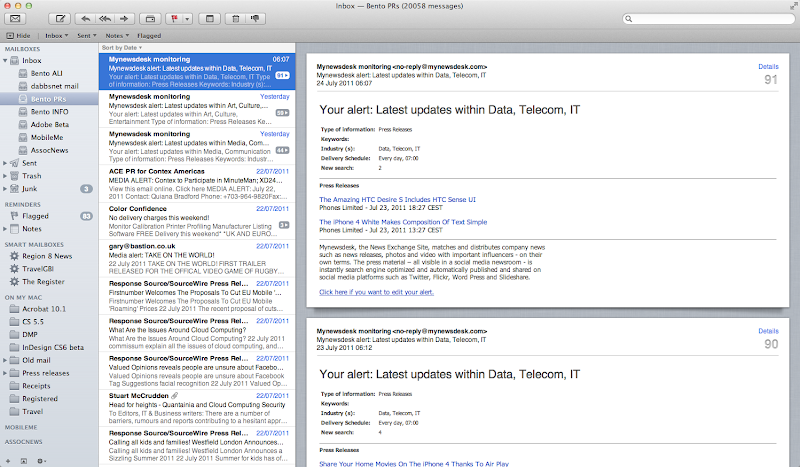Yes, it’s that time again. We are ready for first bugfixing release in 0.9.x series of our beloved web browser.
We basically have a couple of crash bugs fixed and some nice clean up there, so rekonq 0.9.1 is absolutely the best choice for all people that don’t like pull and compile master branch every week 🙂
If you cannot wait your distro upgrading and pushing a compiled package, just grab sources from our website and compile it yourself.
I had a really busy period at work and I really could not release it before, also because our work is absolutely pointed to the next release, improving sync situation, giving real support for it, implementing news for privacy and… some other things not so important 🙂
I will blog about the upcoming news in a couple of weeks or so. For example, yesterday, in a secret local branch, I reached current situation:
Yes, these are first bits for chrome extension support. Don’t look at icons: I just trying to support extension installed in my chromium copy and modified them to test UI capabilities. The easiest part is done, let’s say starting working on it (5% ot total) + supporting browsers and page actions on our UI (another 5% of total). This is not really a lot more other just tried to implement and I don’t know when/if we’ll support a “decent” percentual of their extensions. In fact, the news here is just that I (myself) started working on it 🙂
Last unimportant thing I have to say is that I recently tested again my preferred mail client to start reusing it: kmail.
While I noticed some improvements from last time, there are things that really I don’t understand and I seriously doubt I can really restart using it. Apart from design decisions (2 daemons + 2 different storing solutions for an approximate memory usage of 190 MB on my machine + 53 MB for the kmail app. This means around 240 MB to run kmail. I am on 85 MB with thunderbird), what shocked me is that CPU goes quite everytime 100% and that I need to wait around 30 seconds to see kmail UI!
Instead, a couple of days ago I had to have launch break in an electonic shopping center. So, I sitted down in front of a Mac-something PC, configured it for my needs and used it for quite an hour as it was mine 🙂
What an astonishing experience using this:
Can you see ALL thread shown there in the main view? And.. why apple osx basically doesn’t know the “scrollbar” concept and live anyway happy?
So, here you are news from adjam’s land, I’m leaving in one day for a fantastic holiday trip in the Indian Ocean. See you when I’ll be back! Enjoy!



Yes, KDEPIM today is a joke, but tomorrow will be just a laughing stock.
Vishesh Handa have fix for memory usage – http://vhanda.in/blog/2012/04/virtuoso-problems-no-more/
Thanks fo Rekonq update.
Thanks for your work.
And many thanks for working on chrome extension support. I can’t tell you how fantastic this sound. I know it will be a long road. But this gives me hope to replace someday ff and chrome.
Don’t know if the mail client of OS X is as feature rich as kmail, but visually it’s the best I’ve ever seen. But at this time kmail has major problems with core functions. Hoping the pim team will go on an will be succsessful someday in any domain
“And.. why apple osx basically doesn’t know the “scrollbar” concept and live anyway happy?”
You can enable the scrollbars, and the simple reason it’s hidden by default is because of the trackpad. Using it, love it! It works so fluent.
When you plug a mouse in the machine, the scrollbars will also restore automatically.
“Don’t know if the mail client of OS X is as feature rich as kmail, but visually it’s the best I’ve ever seen”
You should try Thunderbird. It’s far better than apple.
I think it is awesome that you are working on this. I think Webkit has many advantages over Gecko, but firefox still is king when it comes to extensions…even still.
I have high hopes for Rekonq. I have been hesitant to fully jump on the Chromium bandwagon, since newer versions of firefox perform well enough on my higher-ish end (as of 3 years ago) hardware. The reason is not because I think Gecko is better than Webkit, but I am not ready to put my security in the hands of Google developers when it comes to really sensitive stuff….casual web browsing maybe, but not if I want to proxy my browswer with anonimity software like I do with Firefox and others like Opera.
(I am going somewhere with this)
Chrome is allegedly ‘secure’, more secure than ‘firefox’ according to the tests they ran. The problem with those tests though is that ‘security’ depends almost entirely on your threat model, and also what your behaviors are. Maybe Chrome is better at handling malicious Javascript, but I run NoScript anyway, and “NoScripts” for Chromium is a poor alternative if it forces you to log in. ‘ScriptNo’ is simple, but it lacks nuanced functionality. Vanillia Chrome may as of yet be more secure for the kinds of hacks that you encounter on websites and by script kiddies…..Firefox is also older after all, so there are more tools for it.
However, if your threat model is based on the kind of tracking that is done by powerful well coordinated entities like Google and Facebook and Yahoo and perhaps even oppressive governments in ‘foreign’ countries….heh…Spying that is done by the ISP’s themselves..That is not the kind of threat model that you test with a cracking suite. I do not like how Chrome keeps bugging you to log in and to intergrate your browser with their services….Desktop intergration is one thing, though it needs to be done carefully, intergration with an outside corporate entity is something else entirely.
Last point. Many of us are not just worried about malicious scripts. The more security conscious know how to block and limit what we see on a case by case basis anyway. We are worried about coordinated data mining and lack of privacy. We are also worried about services that expose ‘localhost’ to the web and other snoopers. localhost is where a lot of P2P services, including darknets, are running from. Our threat model is different, and our browser needs to reflect this.
Some requirements that would make a browser better than Chromium (or Firefox).
1. Do not broadcast our IP or other personally idnetifying data unless we tell it to. If we are using P2P software, its because we want to be anonymous, probably for perfectly legitimate and harmless reasons like not wanting to be datamined because its creepy.
2. We want to be able to allow things like Javascript on a case by case basis, without having to ‘log in’ to install the app for it. We want generic extension names that do not ID us to the very parties we are trying to block.
3. We want to be able to spoof headers….I applaud Rekonq for including the browser spoofer by default. Something like CSLite.
3. We want profiles that do not share folders or access to each others stored data, or else a way to set different proxies for different tabs with color coding….but profiles is sufficient, and already exists. Of course we need proxy switchers as well, in addition to header spoofing.
4. It would be nice if the browser could work with existing desktop security (without creating new risks, or else its not worth it), to log suspicious activity. This might already exist, but I would like to see an actual log of all the shady stuff that is being done, time stamped, when I visit a site like Facebook. This should not be accessible by the browswer though. The browser should be able to output (calculate) data for a log, but lack the ability to interperet the data itself. An encrypted transfer to the log interpreter would be even better. That way the log will not be another security problem since the one-way output can only happen in real time and cannot be retrived by the browser itself.
5. We need a solution for the problems presented by over reliance on PGP keys (and similar). There was a good little blog post that was talking about how GPG/PGP keys offer ‘Pretty Good Privacy’ but ‘Pretty Poor Anonimity’. If we are using the same keys to access nonlocal servers/services all over the web, including when we download extensions that include unique identifiers to that individual installation, it may offer the “security” of knowing that your install is not being spoofed by an attacker (rare anyway) or even offer the security of encryption and short term privacy, but giving out public keys all over the web is a bigger tracking threat than cookies are even. These keys more or less prove who is doing what, which may be good in a corporate environment where you want to keep tabs on employees, but it is not good for desktop users who want to browse without their browser making a convenient ‘web of personal history’ for others to pick apart.
It would be cool if the browser could generate 1 time keys, then throw them away, while spoofing any identifying data in the process. Maybe have an alternative to static keys, or somehow proxy them, or use generic ones….maybe there is a solution I am not thinking of.
Anyway….If I could have all that, even without #4 which is a tall order, I wouldnt need any other extensions besides maybe a video downloader and the option to delete cookies for specific pages.
Thank you for taking the time to listen.
If you need any help, I have a lot of programmer friends. If you need any resources to improve Rekonq I would be willing to tap my friends network to help you out.
Sorry for spelling. I have a little girl jumping on me 🙂 And hitting me
Hi, and thanks for your time and your interesting comments. I’ll see what can be included in rekonq in the foreseeing future. Have a nice day, Regards,
@Black Sector: Just correcting: you mean YOU want/need …
Extension support and spell check would be most supreme!
Extensions are for 3.0. LIndsay Mathieson is working on spell check support. That is for “when it’s ready”.